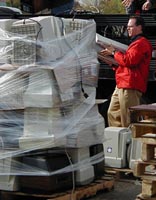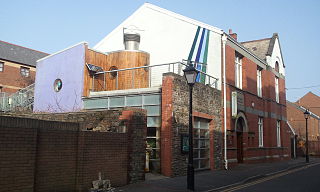Related Research Articles

Recycling is the process of converting waste materials into new materials and objects. The recovery of energy from waste materials is often included in this concept. The recyclability of a material depends on its ability to reacquire the properties it had in its original state. It is an alternative to "conventional" waste disposal that can save material and help lower greenhouse gas emissions. It can also prevent the waste of potentially useful materials and reduce the consumption of fresh raw materials, reducing energy use, air pollution and water pollution.
Planet Ark Environmental Foundation is an Australian not-for-profit environmental organisation, founded in 1992, which works with the public and business alike to help find the simple ways in which they can reduce their impact on the planet, at home, at work and in the community. It is best known for its high-profile recycling campaigns including 'Cartridges 4 Planet Ark', Australia's 'National Recycling Week' and the country's biggest annual community tree-planting event, National Tree Day. The organisation is operated from its office in Sydney.

Zero waste is a set of principles focused on waste prevention that encourages the redesign of resource life cycles so that all products are reused. The goal is for no trash to be sent to landfills, incinerators or the ocean. Currently, only 9% of plastic is actually recycled. In a zero waste system, material will be reused until the optimum level of consumption. The definition adopted by the Zero Waste International Alliance (ZWIA) is:
Zero Waste: The conservation of all resources by means of responsible production, consumption, reuse and recovery of all products, packaging, and materials, without burning them, and without discharges to land, water or air that threaten the environment or human health.

Keep Britain Tidy is a UK-based independent environmental charity. The organisation campaigns to reduce litter, improve local places and prevent waste. It has offices in Wigan and London.

Computer recycling, electronic recycling or e-waste recycling is the disassembly and separation of components and raw materials of waste electronics. Although the procedures of re-use, donation and repair are not strictly recycling, these are other common sustainable ways to dispose of IT waste.

Reuse is the action or practice of using an item, whether for its original purpose or to fulfill a different function. It should be distinguished from recycling, which is the breaking down of used items to make raw materials for the manufacture of new products. Reuse – by taking, but not reprocessing, previously used items – helps save time, money, energy and resources. In broader economic terms, it can make quality products available to people and organizations with limited means, while generating jobs and business activity that contribute to the economy.

Waste minimisation is a set of processes and practices intended to reduce the amount of waste produced. By reducing or eliminating the generation of harmful and persistent wastes, waste minimisation supports efforts to promote a more sustainable society. Waste minimisation involves redesigning products and processes and/or changing societal patterns of consumption and production.
TIDY Northern Ireland is a non-profit environmental organisation that runs the "Keep Northern Ireland Tidy Campaign", and manages a number of local environmental quality programmes such as Blue Flag, Seaside Awards, Green Coast Awards, Borough Cleanliness Survey, Northern Ireland Litter Survey, BIG Spring Clean, Coast Care, River Care and Lough Care, TIDY Business, Young Reporters on the Environment and Eco-Schools. Many of these programmes also operate beyond Northern Ireland.
The Green Student Council is a non-profit organisation concerning local environmental problems that was founded in August 1993, in Hong Kong, China. Members include accountants, teachers and lawyers, as well as university students. They are expected to bring the idea of environmental protection to the fields they are in.
Precycling is the practice of reducing waste by attempting to avoid bringing items which will generate waste into home or business. The U.S. Environmental Protection Agency (EPA) also cites that precycling is the preferred method of integrated solid waste management because it cuts waste at its source and therefore trash is eliminated before it is created. According to the EPA, precycling is also characterized as a decision-making process on the behalf of the consumer because it involves making informed judgments regarding a product's waste implications. The implications that are taken into consideration by the consumer include: whether a product is reusable, durable, or repairable; made from renewable or non-renewable resources; over-packaged; and whether or not the container is reusable.

Upcycling, also known as creative reuse, is the process of transforming by-products, waste materials, useless, or unwanted products into new materials or products perceived to be of greater quality, such as artistic value or environmental value.
Sustainable fashion is a movement and process of fostering change to fashion products and the fashion system towards greater ecological integrity and social justice. Sustainable fashion concerns more than just addressing fashion textiles or products. It addresses the entire manner in which clothing is produced, who produces it, and how long the life span of a product is before it reaches the landfill. This sustainable movement combats the large carbon footprint that the fashion industry and fast fashion have created by reducing greenhouse gas emissions. Reducing the environmental impact of fashion can combat air pollution, water pollution and overall climate change that could possibly prevent millions of premature deaths over the next century.

A balloon release is a ceremonial event in which a number of hydrogen- or helium-filled balloons are unleashed into the sky. Balloon releases can be done as a prayer ceremony, to create a photo opportunity, to raise awareness of a cause or campaign, or as a competitive long-distance race.
Paint is a recyclable item. Latex paint is collected at collection facilities in many countries and shipped to paint-recycling facilities.
Bristol was ranked in 2008 as the UK's most sustainable city by the environmental charity Forum for the Future, and in 2015 it received the European Green Capital Award. The Bristol Green Capital initiative is managed by a partnership supported by the City Council. Bristol is home to the environmental charities Sustrans, the Soil Association, and the Centre for Sustainable Energy. The city provides a range of recycling services for household waste.

Mobile phones can be recycled at the end of their life.

The Environment Centre in Swansea, Wales, is an independent charity organisation for environmental information, education and activity. Environment Centre may also refer to the building the charity is located in.
RREUSE is an international non-profit network (NGO) representing social enterprises active in the field of reuse, repair and recycling sector. The very specialised European network puts the three pillars of sustainability at an equal level: environmental protection, social equity, and economic viability.

Zero Waste Week is an environmental campaign to reduce landfill waste, and takes place annually during the first full week in September. It is a non-commercial grass-roots campaign to demonstrate means and methods to reduce waste, foster community support and bring awareness to the increasing problem of environmental waste and pollution.
Keep Scotland Beautiful is an environmental charity based in Scotland, which aims “to make Scotland a cleaner, greener and more sustainable place to live, work and visit.” The organisation campaigns and educates on a range of environmental issues including climate change and litter reduction.
References
- ↑ "Who we are · Waste Watch". www.wastewatch.org.uk. Archived from the original on 2010-10-25.
- ↑ Archived at Ghostarchive and the Wayback Machine : Recycler the Robot. YouTube .